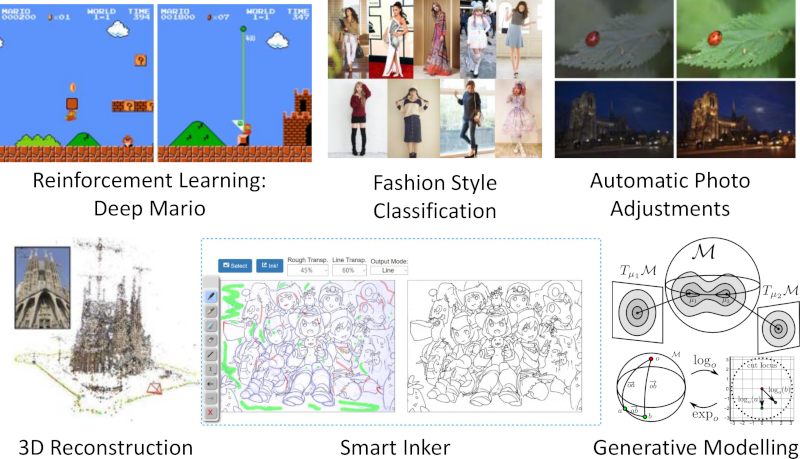2022 Graduate Admissions
If you want to increase your success rate, double your failure rate.
Important Notes!
- Many e-mails get caught in the spam filter and responses can be very slow as a result.
- In general, it is rare to get accepted as a Ph.D student directly unless you have a good publication record. It is recommended to apply for a master’s position first.
- You should apply to either the English or Japanese program depending on your language proficiency. Do not apply to the Japanese program if you are not fluent enough to give technical presentations in Japanese.
- Getting into esslab is fairly competitive. If you just want to learn about computer vision or machine learning, it is recommended to look into other laboratories.
- If you want to know more about the lab, it is possible to participate in the open house event held in march every year. An announcement will be made on the website when the date gets near.
Simo-Serra Lab is accepting students who will enroll in the Department of Computer Science and Engineering FSE Graduate school program including both master students and PhD students. Supervision can be carried out either in Japanese or in English.
It is highly recommended for students to have familiarity/interest in python programming and Linux before joining the lab, as all development is done on a Linux cluster using predominantly the python programming language. In the case of not being familiar with Python and Linux, a willingness to learn is essential.
Upon joining the laboratory, students are expected to propose a research topic related to one of the below research areas. It is recommended to choose a topic in which you are interested in. Some previous topics are:
- Interactive Website Design project site
- Inking rough sketches project site
- Relighting digital paintings project site
- Remastering old film project site
- Enhancement of photos paper

Research Areas
-
AI-Aided Content Design (Computer Graphics, Primary Topic)
- Interactive Neural Networks
- Human-Computer Interface (HCI)
- Reinforcement Learning for Design
- Real-Time Interaction
- Optimization
- Personalization and Customization
- Applications to Illustration, Games, Animation, etc.
- Representation Learning (Machine Learning)
- Multi-Modal Learning
- Weak Supervision
- Model Compression
- Image Processing (Computer Vision)
- Fully Convolutional Networks
- Hierarchical Models
Research Topics
Our research focuses on creating smart tools and interfaces for supporting content design using machine learning techniques with an objective of allowing users to not only create content, such as illustrations or movies, faster, but also of higher quality. This is done by employing and developing the cutting edge machine learning techniques, such as convolutional neural networks (deep learning) and conditional random field models. We focus on practical problems with high impact in the daily workflow of creators.
In particular, most of the research is focused on, but not limited to, image translation tasks, in which the input is an image, such as a rough sketch, and the output is also an image, such as a line drawing. These tasks are characterized by needing to process large amounts of visual data as a single image is composed by millions of pixels, for which convolution operators have shown high performance. As humans are primarily visual creatures, many different content design tasks can be formulated as image translation tasks such as colorization of black and white images, inking of rough sketches, or completing regions of an image.
Much of the recent research is based on deep learning and in particular convolutional neural networks given their high performance in a wide variety of tasks. However, despite seeming like a one-fits-all solution, there are many issues that have to be resolved when designing models such as computational cost, interactivity, representation capacity, optimization paradigm… It is to be noted that most of the research can be formulated as energy minimization optimization problems and thus optimization plays a fundamental role.
Application Tips
- Propose research topics that you are motivated about.
- Try to think about the big picture. How will your research affect others?
- Be curious.
- Try to be concise in your exposition.
Recommended Self-Study
A large amount of students in the laboratory join in their 3rd year of their bachelor studies and continue onto graduate studies. This gives them a two year advantage with respect to students who join for their graduate studies. To minimize the skill gap, it is recommended that all students who are seriously interested in applying to familiarize themselves with the following books: